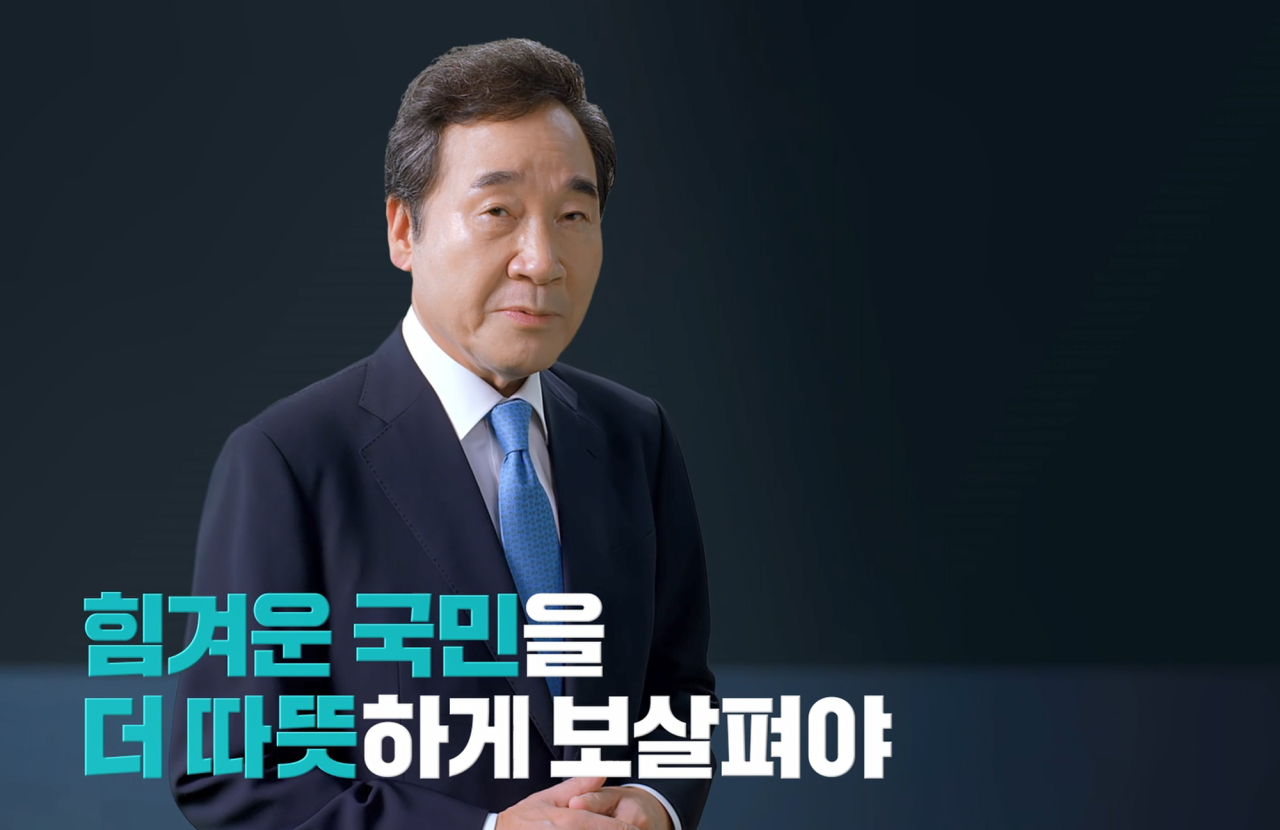Former Democratic Party leader Rep. Lee Nak-yon announced his presidential bid Monday.
With Lee’s announcement, the race among the ruling bloc’s “Big Three” -- the others being Gyeonggi Gov. Lee Jae-myung and former Prime Minister Chung Sye-kyun -- began in earnest.
In a video clip released on YouTube at 10 a.m., the former prime minister and Democratic Party leader presented a five-point policy blueprint for South Korea that consisted of a new approach to social welfare, a middle-class economy, amendment of the Constitution, a new diplomacy based on soft power, and culture power.
“As the gap in our society widens, inequality has grown through the pandemic,” Lee said. “As many people, including the young, are protesting against unfairness in the world, it is urgent to ease inequality and we need to rebuild the damaged justice.
“Many people are anxious about their lives. Young, middle-aged and old people are all anxious,” said Lee, who defined the current times in Korea as an “age of anxiety.”
“The number of life-threatening factors has increased tremendously,” he said. “The state should protect each and every citizen’s life from all such threats. The country should be one that protects our life. I will do the job.”
He described what he called his new approach to social welfare, the first part of his vision.
“We have promoted welfare in earnest and made progress in many fields since the Kim Dae-jung administration, but there are still people who don’t live a life at least as human beings. We must ensure that there are no such people.
“The start of new welfare is to ensure that everyone has a basic life as a human being,” he said. He vowed that the state would take responsibility for ensuring decent living standards not only in income but also in housing, labor, education, medical care, culture and the environment.
“One in 3 young people in Seoul lives in ‘Hellgo,’” he said, vowing to change this.
“Hellgo” is a newly coined term that refers to life in a basement or rooftop apartment, or in a low-budget residence called a “gosiwon” with tiny rooms and often shared kitchen and bathroom facilities. The first syllables of “basement” and “rooftop” spell “hell” in Korean.
Regarding the second part of his vision, he talked about establishing a middle-class economy.
“When the middle class gets thinner, inequality increases and society becomes vulnerable to crisis. We will increase the share of middle-class people to 70 percent, which is now 57 percent.”
He also pledged to revise the Constitution to strengthen socioeconomic democracy.
The Constitution should recognize the right to life, safety and housing, he said, and social inequality should be reduced by recognizing that the ownership and disposal of land may be legitimately restricted for the public good. He also promised to establish a constitutional basis for the balanced development of the nation’s metropolitan and provincial areas.
He also vowed to pursue a new kind of diplomacy in the form of soft power based on economy and culture.
“The world has entered an era of softness, where economy and culture are more important than force and territory,” he said.
To this end, he aims to establish an institutional settlement of peace on the Korean Peninsula by following in the footsteps of Presidents Kim Dae-jung, Roh Moo-hyun and Moon Jae-in; to strengthen the Korea-US alliance and the Korea-China strategic cooperative partnership; to pioneer cooperation with Japan and Russia; and to expand win-win cooperation with all countries in the world.
The last part of his policy vision, Lee said, was to make Korea a cultural powerhouse.
“We are a country with (boy band) BTS, (movie director) Bong Joon-ho and (actress) Youn Yuh-jung. So the dream of Teacher Kim Gu is being realized.
“Culture and art become more creative and more beautiful as long as they are not interfered with. I will leave culture and the arts to their market thoroughly. The government will close its mouth and only open its wallets,” he promised.
On Sunday, the Democratic Party of Korea held the second national interviews to select candidates for the presidential election at CJB Convention Center in Cheongju.
The event consisted of blind interviews with 200 interviewers, and the candidates did not have the right to refuse to answer questions. The 200 interviewers evaluated them in real time and then announced the top three.
After the interviews, Lee Nak-yon took first place in the preliminary round. Rep. Lee Kwang-jae placed second and Gyeonggi Province Gov. Lee Jae-myung placed third.
Still, a recent poll showed that Gyeonggi Gov. Lee is ahead of the other candidates from the ruling bloc.
According to the poll results -- released Sunday by opinion polling agency Global Research, which surveyed 1,000 men and women over the age of 18 across the country from June 30 to July 2 -- Gyeonggi Gov. Lee received the highest rating at 34.7 percent.
Lee Nak-yon followed with 12.9 percent. Former Justice Minister Choo Mi-ae received a 3.8 percent rating, followed by former Prime Minister Chung Sye-kyun with 3.6 percent and Rep. Park Yong-jin with 3.3 percent.
The Democratic Party will announce six finalists for the main competition July 11.
By Shin Ji-hye (
shinjh@heraldcorp.com)








